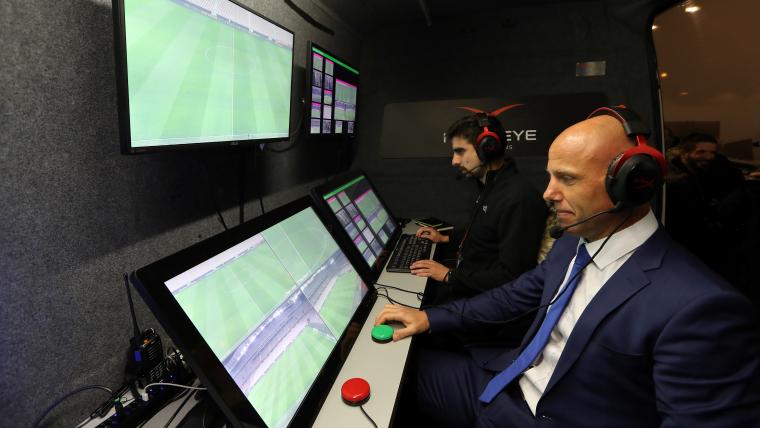The VAR Controversy in the FA Cup
The use and absence of Video Assistant Referee (VAR) technology in the FA Cup have sparked numerous controversies in recent seasons. Newcastle United fans, for instance, felt that their team might have avoided a shocking defeat to Championship side Sheffield Wednesday in the 2022/23 season if VAR had been employed. The Owls’ victory was marred by a suspected offside goal, which amplified the debate over the necessity of VAR in such high-stakes matches. Conversely, Manchester United’s 1-0 win against Aston Villa in 2022 was aided by a complex VAR review that disallowed an equalizer for the visitors. These incidents highlight the mixed impact of VAR and raise questions about its deployment in the FA Cup.
VAR in the 2024/25 FA Cup
For the 2024/25 FA Cup, VAR will only be utilized from the fifth round onwards. This decision marks a significant shift in the use of VAR, ensuring that it is employed consistently across all matches from the fifth round to the final. Unlike previous seasons, where VAR was limited to matches at Premier League grounds and Wembley Stadium, this year’s implementation aims to provide a uniform refereeing standard for all participating clubs. The FA announced this decision in December 2024, emphasizing the need for consistent refereeing practices across the competition. The introduction of VAR in the fifth round is seen as a step towards fairer and more transparent decision-making in crucial matches.
The Four Situations for VAR Usage
VAR can be employed in four specific scenarios during a match. These include:
- Goal/No Goal: VAR can assist in determining whether a goal should stand or not, particularly in cases of offside or foul play.
- Penalty/No Penalty: VAR can review decisions related to penalty kicks, ensuring that fouls are accurately identified.
- Direct Red Card: VAR can assess incidents that warrant a direct red card, such as violent conduct or serious foul play.
- Case of Mistaken Identity: VAR can help correct situations where the referee has sent off the wrong player.
In each of these scenarios, the referee’s initial decision is the starting point for a VAR review. The on-field official cannot defer the decision to VAR initially but can use VAR to check the correctness of their call. The final decision always remains with the on-field referee, who may use the pitchside monitor to review the incident. This process ensures that the referee remains the ultimate decision-maker while leveraging VAR to ensure accuracy.
Historical Context of VAR in the FA Cup and Premier League
VAR was first used in a competitive English game on January 8, 2018, when Brighton & Hove Albion defeated Crystal Palace 2-1 at the Amex Stadium in the FA Cup. This marked a significant milestone in the implementation of VAR in English football. Two days later, VAR was used again in a Carabao Cup semifinal first leg between Chelsea and Arsenal, highlighting its growing acceptance across various competitions. Premier League clubs voted to introduce VAR from the start of the 2019/20 season, following extensive behind-the-scenes testing. This decision was a response to the increasing demand for more accurate and fair refereeing, driven by numerous high-profile controversies in the past.
The Importance of FIFA Approval
The use of VAR in any match or competition requires written permission from FIFA and the fulfillment of FIFA’s Implementation Assistance and Approval Programme (IAAP). This ensures that the technology meets the highest standards of reliability and consistency. The FA’s decision to implement VAR from the fifth round onwards in the 2024/25 FA Cup is in line with these requirements, reflecting a commitment to fair play and transparency. The rigorous approval process helps maintain the integrity of the game and ensures that all stakeholders, including clubs, players, and fans, have confidence in the refereeing decisions.
How to Watch the 2024/25 FA Cup
For fans looking to follow the 2024/25 FA Cup, the table below provides information on where to watch selected matches in various major territories:
- USA: ESPN (TV), ESPN+ (Streaming)
- Canada: Sportsnet (TV)
- UK: BBC, ITV (TV), BBC iPlayer, ITV X (Streaming)
- Australia: Optus Sport (TV, Streaming)
- India: Sony TEN (TV), JioTV, Sony LIV (Streaming)
These platforms offer comprehensive coverage, ensuring that fans can enjoy the drama and excitement of the FA Cup from the comfort of their homes. Whether you are a die-hard supporter or a casual viewer, the FA Cup promises thrilling matches and unforgettable moments, especially with the introduction of VAR from the fifth round onwards.











